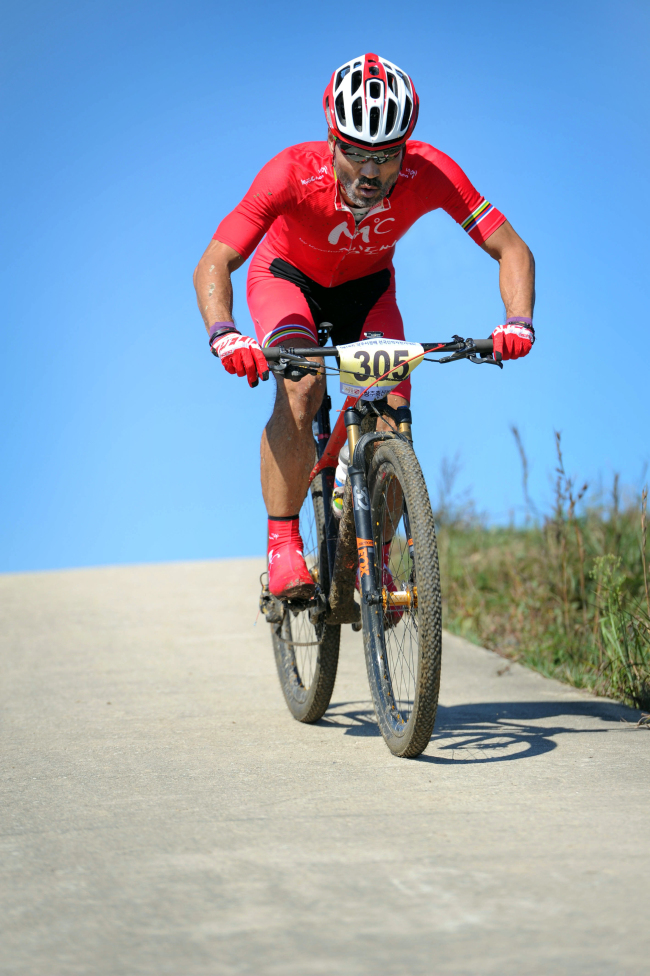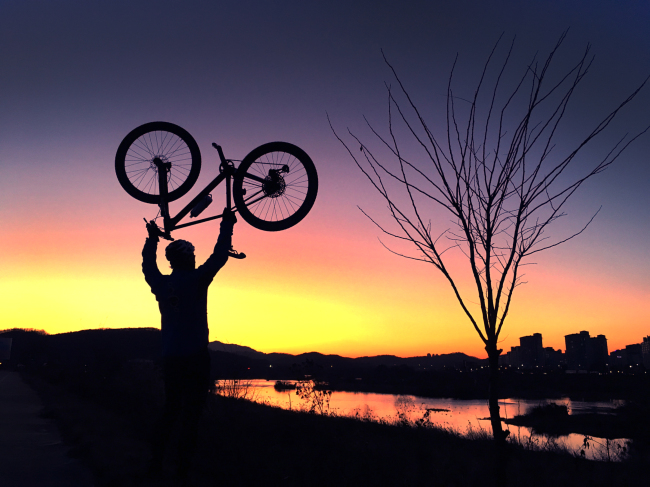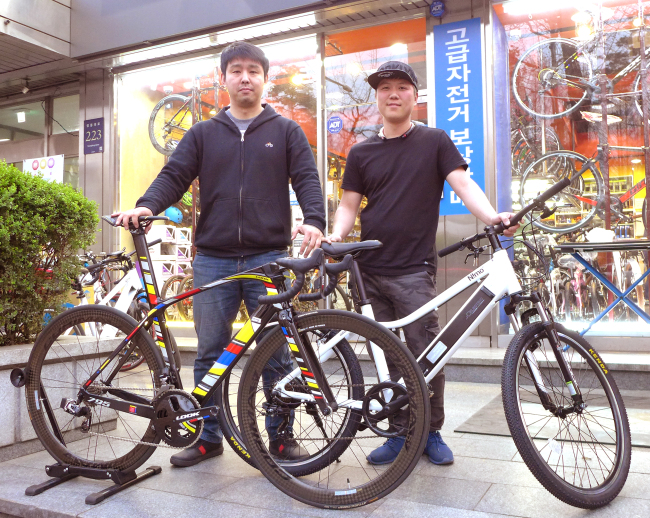Korea treads steadily toward cyclists’ haven
“We need to fundamentally change and improve the public’s understanding of cycling. Rules and regulations are of no use without proper culture.”
By Korea HeraldPublished : April 21, 2017 - 18:29
Wearing a skintight outfit on his steely, muscled frame, Lee Sang-won has hit all corners of Korea on two wheels over the last decade.
“The sceneries of rivers, coastlines, mountains and rice paddies were ineffably beautiful,” the 62-year-old man recalled with a nostalgia-tinged smile.
Lee, the pacesetter for the nation’s growing legion of cyclists, has clinched nearly 50 amateur titles, including two national championships last year. As Koreans are increasingly becoming more concerned with their health and well-being, cycling is booming among many as their first resort of transit and leisure, he said.
The bicycle manufacturing industry, which focused on mountain, road and hybrid bikes previously, has started churning out more and more electric bikes, following recent legislation to allow electric bicycles to enter bike paths starting next March. Electric bikes should have an automatic brake that limits the speed to 25 kilometers per hour.
“The sceneries of rivers, coastlines, mountains and rice paddies were ineffably beautiful,” the 62-year-old man recalled with a nostalgia-tinged smile.
Lee, the pacesetter for the nation’s growing legion of cyclists, has clinched nearly 50 amateur titles, including two national championships last year. As Koreans are increasingly becoming more concerned with their health and well-being, cycling is booming among many as their first resort of transit and leisure, he said.
The bicycle manufacturing industry, which focused on mountain, road and hybrid bikes previously, has started churning out more and more electric bikes, following recent legislation to allow electric bicycles to enter bike paths starting next March. Electric bikes should have an automatic brake that limits the speed to 25 kilometers per hour.

Young people prefer road bikes -- with a lightweight, svelte frame simultaneously enabling speed and grace -- while older generations largely choose mountain bikes that are more comfortable, using a flexible frame equipped with shock absorbers, he said in an interview.
“Korea has world-class bike infrastructure, with paths all around the country and along major rivers, but car drivers are inconceivably inconsiderate, reckless and intimidating toward cyclists,” Lee said. “It is time we as a country make all-out efforts to upend the culture sidelining cycling, by establishing bike-centered transportation policies and running campaigns to prevent accidents.”
Noting that drivers in advanced countries such as Japan, Denmark and the Netherlands turn their wheels carefully around cyclists -- by anticipating their moves and steering in a safe direction -- Lee argued it was possible because most drivers are cyclists in their own right and riders strictly observe traffic signals and regulations.
“That’s how drivers and riders can coexist harmoniously,” he said, adding that such harmony has made little headway in Korea. Lee noted the government’s strengthened crackdown on illicit parking on bike lanes and continuing addition of bike lanes. “In the foreseeable future I expect bicycles to lay down roots as a viable form of transportation,” he said.
Acknowledging the worsening air pollution from fine dust particles, Lee advised riders to avoid days with notably dreggy skies, or wear a mask while cycling.

Choi Bo-song, head manager of a Giant bike store in Seoul, said whereas people preferred mountain bikes in the past due to bumpy roads, more riders are switching to road, hybrid and electric bikes. His store near Hangnyeoul Station also sells Look and Alton bikes.
“Road bikes are like sports cars, while mountain bikes are like sedans,” Choi said in an interview, adding that road bikes, produced largely from carbon, are relatively stiff and offer greater speed at the expense of comfort. Mountain bikes, commonly manufactured from titanium, are softer and easier on the body. Carbon and titanium weigh similarly, he said.
Shawn Kim, head manager of GoGoShop in Seoul, said 70 percent of customers purchase road bikes these days, and the rest go for mountain or hybrid bikes. The general trend he has observed is the “gentrification” of consumers’ choices, including those of entrants. He said customers have shifted their gears to buy quality bikes and equipment, spending from $1,500 to $3,500 at his store.
“In the old days, people used to ride whatever they could get their hands on. People rode chrome-moly steel bikes, and moved onto aluminum, before siding with carbon or titanium-made bikes, which are light, elastic, springy and sturdy,” Kim said.
“The steadfast riders emulate professional cyclists undoubtedly,” Kim said. “Even if they have to pay handsome amounts, the satisfaction of a fine-tuned experience is worth every penny of their investment, they believe.”

Pointing to advanced countries like Japan, where mothers feel safe enough to carry their baby in a basket in front of the bike handle, Kim said that Korea is in a “transition period” coming on the heels of those front-runners. “We are taking baby steps but moving ahead,” he said.
In advanced countries, bikes are often registered, norms are democratized and theft occurs far and few, he said. In contrast, cyclists in Korea are too often harassed and harmed by cars and a slight misjudgment on the road could enrage drivers fast and furiously.
“We have a long way to go,” Kim said. “What’s vitally needed is proper education of cyclists so that they don’t ‘drink and ride,’ as well as of drivers so that they are aware of the bikers’ legitimate right to be on the road.”
Choi Bo-song chimed in, saying, “We need to fundamentally change and improve the public’s understanding of cycling. Rules and regulations are of no use without proper culture.”
Concerted efforts should be also made to improve the air quality by limiting diesel cars and promoting electrical cars, Choi said.
By Joel Lee (joel@heraldcorp.com)
-
Articles by Korea Herald


![[AtoZ into Korean mind] Humor in Korea: Navigating the line between what's funny and not](http://res.heraldm.com/phpwas/restmb_idxmake.php?idx=644&simg=/content/image/2024/04/22/20240422050642_0.jpg&u=)
![[Exclusive] Korean military set to ban iPhones over 'security' concerns](http://res.heraldm.com/phpwas/restmb_idxmake.php?idx=644&simg=/content/image/2024/04/23/20240423050599_0.jpg&u=20240423183955)


![[Herald Interview] Why Toss invited hackers to penetrate its system](http://res.heraldm.com/phpwas/restmb_idxmake.php?idx=644&simg=/content/image/2024/04/22/20240422050569_0.jpg&u=20240422150649)
![[Graphic News] 77% of young Koreans still financially dependent](http://res.heraldm.com/phpwas/restmb_idxmake.php?idx=644&simg=/content/image/2024/04/22/20240422050762_0.gif&u=)







![[Exclusive] Korean military to ban iPhones over security issues](http://res.heraldm.com/phpwas/restmb_idxmake.php?idx=652&simg=/content/image/2024/04/23/20240423050599_0.jpg&u=20240423183955)



![[Today’s K-pop] Ateez confirms US tour details](http://res.heraldm.com/phpwas/restmb_idxmake.php?idx=642&simg=/content/image/2024/04/23/20240423050700_0.jpg&u=)